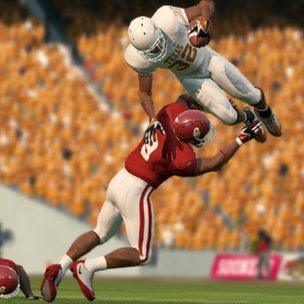Defeat for EA over faces of sports stars
- Published

Virtual college football is almost identical to real football, said appeal court judges
A former college football player has scored a court victory against Electronic Arts.
EA used Rutgers College quarterback Ryan Hart's likeness in several versions of its popular NCAA Football sports game.
Mr Hart sued seeking damages saying EA should have sought his permission before using his likeness in the game.
A US court threw out his initial claim but that earlier decision has now been reversed on appeal.
Cash call
Explaining their decision, appeal court judges said EA's freedom of expression rights did not outweigh Mr Hart's rights over the control of his image.
EA trespassed on that right by not doing enough to "sufficiently transform" the virtual Ryan Hart it created for the three versions of NCAA Football it published between 2004 and 2006.
"The digital Ryan Hart does what the actual Ryan Hart did while at Rutgers: he plays college football, in digital recreations of college football stadiums, filled with all the trappings of a college football game," wrote Judge Joseph Greenaway in documents outlining the decision.
Lawyer Michael Rubin, who represented Mr Hart during the appeal, said the decision set a "wonderful precedent" and would help any athlete or other public figure protect their identity against unwanted commercial exploitation.
The decision could have implications for another court case brought by former college football player Samuel Keller who also sued EA for using his likeness in the game.
The case now returns to a lower court where Mr Hart will seek compensation for use of his likeness. EA said it would try to get the decision reviewed prior to the court case re-starting.
It is not clear what effect the decision could have on current college football players. The National Collegiate Athletic Association has strict rules on how much players can earn before they lose their amateur status that makes them eligible for college teams.
- Published16 May 2013
- Published10 April 2013
- Published19 March 2013